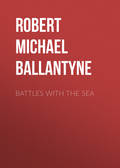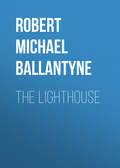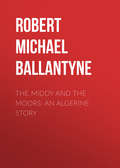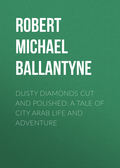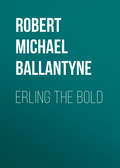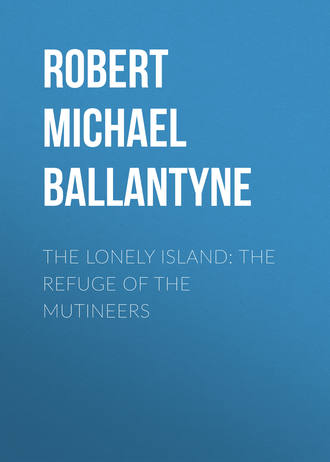
Robert Michael Ballantyne
The Lonely Island: The Refuge of the Mutineers
Chapter Three
The Lonely Island Sighted
It is pleasant to turn for a time from the dark doings of evil men to the contemplation of innocent infancy.
We return to the Bounty, and solicit the reader’s attention to a plump brown ball which rolls about that vessel’s deck, exhibiting a marked tendency to gravitate towards the lee scuppers. This brown ball is Sally, the Otaheitan infant.
Although brown, Sally’s face is extremely pretty, by reason of the regularity of her little features, the beauty of her little white teeth, and the brilliancy of her large black eyes, to say nothing of her luxuriant hair and the gleeful insolence of her sweet expression.
We cannot say how many, or rather how few, months old the child is, but, as we have already remarked, she is a staggerer. That is to say, she has begun to assert the independence of her little brown legs, and progresses, even when on shore, with all the uncertainty of a drunken woman. Of course, the ship’s motion does not tend to remedy this defect. Sally’s chief delight is wallowing. No matter what part of the ship’s deck she may select for her operations—whether the scuppers, the quarter-deck, or the forecastle—she lays her down straightway for a luxurious wallow. If the spot be dirty, she wallows it clean; if it be clean, she wallows it dirty. This might seem an awkward habit to an English mother; but it is a matter of supreme indifference to Sally’s mother, who sits on a gun-carriage plaiting a mat of cocoa-nut fibre, for Sally, being naked, requires little washing. A shower of rain or a dash of spray suffices to cleanse her when at sea. On shore she lives, if we may say so, more in the water than on the land.
The day is fine, and the breeze so light that it scarce ruffles the face of the great ocean, though it manages to fill the topsails of the Bounty, causing her to glide quietly on. Some of the mutineers are seated on the deck or bulwarks, patching a canvas jacket or plaiting a grass hat. Others are smoking contemplatively. John Adams is winding up the log-line with McCoy. Edward Young stands gazing through a telescope at something which he fancies is visible on the horizon, and Fletcher Christian is down in the cabin poring over Carteret’s account of his voyage in the Pacific.
There were goats on board. One of these, having become a pet with the crew, was allowed to walk at liberty, and became a grand playmate for Sally. Besides the goats, Christian had taken care to procure a number of hogs and poultry from Otaheite; also a supply of young breadfruit-trees and other vegetable products of the island, wherewith to enrich his new home when he should find it. All the animals were confined in cribs and pens with the exception of Sally’s playmate.
“Take care!” exclaimed John Adams as he left the quarter-deck with his hands in his pockets; “your mate’ll butt you overboard, Sal, if you don’t look-out.”
There was, indeed, some fear of such a catastrophe, for the precocious infant had a tendency to scramble on any object which enabled her to look over the low bulwarks, and the goat had a propensity to advance on its hind legs with a playful toss of its head and take its playmate by surprise, in truth, what between the fore-hatch, the companion-hatch, and the low bulwarks, it may be said that Sally led a life of constant and imminent danger. She was frequently plucked by the men out of the very jaws of death, and seemed to enjoy the fun.
While attempting to avoid one of the goat’s playful assaults, Sally stumbled up against Matthew Quintal, deranged the work on which he was engaged, and caused him to prick his hand with a sail-needle, at which William McCoy, who was beside him, laughed.
“Get out o’ that, you little nigger!” exclaimed Quintal, angrily, giving the child a push with his foot which sent her rolling to the side of the ship, where her head came in contact with an iron bolt. Sally opened her mouth, shut her eyes, and howled.
Quintal had probably not intended to hurt the child, but he expressed no regret. On the contrary, seeing that she was not much injured, he laughed in concert with McCoy.
These two, Quintal and McCoy, were emphatically the bad men of the party. They did not sympathise much, if at all, with human suffering—certainly not with those whom they styled “niggers;” but there was one witness of the act whose heart was as tender towards the natives as Quintal’s was hard.
“If you ever dare to touch her so again,” said Young, striding up to Quintal, “I’ll kick you into the pig-sty.”
The midshipman seemed to be the last man on board whose natural disposition would lead him to utter such a threat, and Quintal was quite taken aback; but as Young was a powerful fellow, perfectly capable of carrying his threat into execution, and seemed, moreover, thoroughly roused, the former thought it best to hold his tongue, even though lugubrious Isaac Martin chuckled audibly, and Ohoo, one of the natives, who stood near, displayed his fine teeth from ear to ear.
Lifting up Sally with much tenderness, Young carried her to her mother, who, after a not very careful examination of the bruised head, set her down on the deck, where she immediately began to wallow as before. Rising on her brown little feet, she staggered forward a few paces, and then seated herself without bending her knees. From this position she rolled towards the starboard side of the ship and squeezed herself between a gun-carriage and the bulwarks, until she got into the porthole. Thrusting her head over the edge of this, she gazed at the ripples that rolled pleasantly from the side. This was paradise! The sun glittered on these ripples, and Sally’s eyes glittered in sympathy. A very gentle lurch of the ship soon after sent Sally head foremost into the midst of the ripples.
This event was nothing new to Sally. In her Otaheitan home her mother had been wont to take her out for a swim as British mothers take their offspring for a walk. Frequently had that mother pitched Sally off her shoulders and left her to wabble in the water, as eagles are said to toss their eaglets into the air, and leave them to flutter until failing strength renders aid advisable.
No doubt when Sally, falling from such a height, and turning so as to come flat on her back, experienced a tingling slap upon her skin, she felt disposed to shed a salt tear or two into the mighty ocean; but when the smart passed away, she took to wallowing in the water, by way of making the most of her opportunities. Both Christian and Young heard the plunge. The former leaped up the companion ladder, the latter ran to the stern of the ship, but before either could gain the side one of the Otaheitan men, who had witnessed the accident, plunged into the sea and was soon close to Sally. The playful creature, after giving him a kick in the face, consented to be placed on his shoulders.
The ship of course was brought up to the wind and her topsails backed as quickly as possible, but the swimmers were left a considerable distance astern before this was accomplished.
“No need to lower a boat,” remarked Christian, as he drew out the tubes of his telescope; “that fellow swims like a fish.”
“So do all his countrymen,” said Young.
“And the women and children too,” added John Adams, who was at the helm.
“She’s tugging at the man’s woolly head as if it were a door mat,” said Christian, laughing; “and I do believe—yes—the little thing is now reaching round—and pulling his nose. Look at them, Young.”
Handing the glass to the midshipman, he turned to inquire for the child’s mother, and to his astonishment found that brown lady sitting on the deck busy with her mat-making, as unconcerned as if nothing unusual were going on.
The fact was, that Sally’s mother thought no more of Sally falling into the sea than a white mother might of her child falling on its nose—not so much, perhaps. She knew that the ship would wait to pick her up. She also knew that Sally was an expert swimmer for her age, and that the man who had gone to her rescue was thoroughly able for the duty, having, like all the South Sea Islanders, been accustomed from infancy to spend hours at a time in the water.
In a few minutes he came alongside, with Sally sitting astride his neck, holding on to both sides of his head, and lifting her large eyes with a gaze of ecstasy to those who looked over the vessel’s side. She evidently regarded the adventure as one of the most charming that had up to that time gladdened her brief career. Not only so, but, no sooner had she been hauled on board with her deliverer, than she made straight for the porthole from which she had fallen, and attempted to repeat the manoeuvre, amid shouts of laughter from all who saw her. After that the various portholes had to be closed up, and the precocious baby to be more carefully watched.
“I have come to the conclusion,” said Christian to Young, as they paced the deck by moonlight that same night, “that it is better to settle on Pitcairn’s Island than on any of the Marquesas group. It is farther out of the track of ships than any known island of the Pacific, and if Carteret’s account of it be correct, its precipitous sides will induce passers-by to continue their voyage without stopping.”
“If we find it, and it should turn out to be suitable, what then!” asked Young.
“We shall land, form a settlement, and live and die there,” answered Christian.
“A sad end to all our bright hopes and ambitions,” said Young, as if speaking to himself, while he gazed far away on the rippling pathway made by the sun upon the sea.
Christian made no rejoinder. The subject was not a pleasant one to contemplate. He thought it best to confront the inevitable in silence.
Captain Carteret, the navigator who discovered the island and named it Pitcairn, after the young officer of his ship who was the first to see and report it, had placed it on his chart no less than three degrees out of its true longitude. Hence Christian cruised about unsuccessfully in search of it for several weeks. At last, when he was on the point of giving up the search in despair, a solitary rock was descried in the far distance rising out of the ocean.
“There it is at last!” said Christian, with a sigh that seemed to indicate the removal of a great weight from his spirit.
Immediately every man in the ship hurried to the bow of the vessel, and gazed with strangely mingled feelings on what was to be his future home. Even the natives, men and women, were roused to a feeling of interest by the evident excitement of the Europeans, and hastened to parts of the ship whence they could obtain a clear view. By degrees tongues began to loosen.
“It’s like a fortress, with its high perpendicular cliffs,” remarked John Adams.
“All the better for us,” said Quintal; “we’ll need some place that’s difficult to get at and easy to defend, if one o’ the King’s ships should find us out.”
“So we will,” laughed McCoy in gruff tones, “and it’s my notion that there’s a natural barrier round that island which will go further to defend us agin the King’s ships than anything that we could do. Isn’t that white line at the foot o’ the cliffs like a heavy surf, boys?”
“It looks like it,” answered John Mills, the gunner’s mate; “an’ wherever you find cliffs rising like high walls out o’ the sea, you may be pretty sure the water’s too deep for good anchorage.”
“That’s in our favour too,” returned Quintal; “nothin’ like a heavy surf and bad anchorage to indooce ships to give us a wide berth.”
“I hope,” said William Brown the botanist, “that there’s some vegetation on it. I don’t see much as yet.”
“Ain’t it a strange thing,” remarked long-legged Isaac Martin, in a more than usually sepulchral tone, “that land-lubbers invariably shows a fund of ignorance when at sea, even in regard to things they might be supposed to know somethin’ about?”
“How have I shown ignorance just now?” asked Brown, with a smile, for he was a good-humoured man, and could stand a great deal of chaffing.
“Why, how can you, bein’ a gardener,” returned Martin, “expect to see wegitation on the face of a perpindikler cliff?”
“You’re right, Martin; but then, you know, there is generally an interior as well as a face to a cliffy island, and one might expect to find vegetation there, don’t you see.”
“That’s true—to find it,” retorted Martin, “but not to see it through tons of solid rock, and from five or six miles out at sea.”
“But what if there’s niggers on it?” suggested Adams, who joined the party at this point.
“Fight ’em, of coorse,” said John Williams.
“An’ drive ’em into the sea,” added Quintal.
“Ay, the place ain’t big enough for more than one lot,” said McCoy. “It don’t seem more than four miles long, or thereabouts.”
An order to shorten sail stopped the conversation at this point.
“It is too late to attempt a landing to-night,” said Christian to Young. “We’ll dodge off and on till morning.”
The Bounty was accordingly put about, and her crew spent the remainder of the night in chatting or dreaming about their future home.
Chapter Four
The Island Explored
A bright and pleasant morning forms a powerful antidote to the evils of a cheerless night. Few of the mutineers slept soundly on the night of their arrival off Pitcairn, and their dreams of that island were more or less unpleasantly mingled with manacles and barred windows, and men dangling from yard-arms. The blessed sunshine dissipated all this, rousing, in the hearts of some, feelings of hope and forgiveness, in the breasts of others, only those sensations of animal enjoyment which man shares in common with the brutes.
“Lower away the boat there,” said Fletcher Christian, coming on deck with a more cheerful air than he had worn since the day of the mutiny; “we shall row round the island and search for a landing-place. You will take charge, Mr Young, during my absence. Put muskets and ammunition into the boat, John Adams; the place may be inhabited—there’s no saying—and South Sea savages are not a hospitable race as a rule. Now then, look sharp, lads.”
In a few minutes, Adams, Martin, McCoy, Brown, and Quintal were in the boat, with two of the Otaheitan men.
“Won’t you take cutlasses?” asked Young, looking over the side.
“Well, yes, hand down half-a-dozen; and don’t go far from this end of the island, Mr Young. Just keep dodging off and on.”
“Ay, ay, sir,” said the middy, touching his cap from the mere force of habit.
“Shove off,” said Christian, seating himself at the helm.
In a few minutes the boat was skimming over the calm water towards the shore, while the Bounty, wearing round, went slowly out to sea.
As the boat neared the shore it soon became evident that it would be extremely difficult to effect a landing. Nothing could be seen but high precipitous cliffs without any sign of a harbour or creek sufficiently large or safe to afford anchorage for the ship. Worst of all, the only spot that seemed to offer any prospect of a landing-place, even for a boat, was guarded by tremendous breakers that seemed to bid defiance to man’s feeble powers. These great waves, or rollers, were not the result of storm or wind, but of the mere ocean-swell of the great Pacific, which undulates over her broad breast even when becalmed. No signs of the coming waves were visible more than a few hundred yards from the shore. There, each roller gradually and silently arose when the undulating motion of the sea caught the bottom. A little farther in it assumed the form of a magnificent green wall of liquid glass, which became more and more vast and perpendicular as it rolled on, until it curled over and rushed with a mighty roar and a snowy crest towards the beach. There it dashed itself in tumultuous foam among the rocks.
“Give way, lads,” said Christian, sitting down after a prolonged gaze at this scene; “we may find a better spot farther on.”
As they proceeded they were received with wild and plaintive cries by innumerable sea-birds, whose homes were on the cliffs, and who evidently resented this intrusion of strangers.
“Shall we give ’em a shot, sir?” asked McCoy, laying his hand on a musket.
“No, time enough for that,” replied Christian, shortly.
They pulled right round the island without seeing a single spot more available for a landing than the place they had first approached.
It was a very little bay, with a small clump of six cocoa-nut trees near the water’s edge on the right, and a single cocoa-nut tree on the left, about two hundred yards from the others. Above these, on a hill a little to the westward, there was a grove of the same species.
“We’ll have to try it, sir,” said John Adams, looking at his leader inquiringly.
“We’re sure to capsize,” observed McCoy.
“No matter,” said Christian; “we have at last reached home, and I’m bound not to be baffled at the door. Come, Ohoo, you know something about beaching canoes in a surf; there can’t be much difference with a boat. Get up in the bow and direct me how to steer.”
He spoke to one of the native in the imperfect jumble of Otaheitan and English with which the white men had learned to communicate with the natives. Ohoo understood, and at once went to the bow of the boat, the head of which was now directed towards a place in the cliffs where there seemed to be a small bay or creek. The native gave directions with his arms right or left, and did not require to speak. Christian steered with one of the oars instead of the rudder, to give him more power over the boat.
Soon they began to feel the influence of the in-going wave. It was a moment of intense anxiety. Christian ordered the men to cease rowing. Ohoo made a sudden and violent indication with his left arm. Christian obeyed.
“Give a gentle pull, boys,” he said.
They rose as he spoke on the top of a wave so high that they could look down for a moment on the seething foam that raged between them and the beach, and Christian was about to order the men to pull hard, when the native looked back and shook his head excitedly. They had not got sufficiently into the grasp of that wave; they must wait for the next.
“Back all!” shouted the steersman. The boat slid back into the trough of the sea, while the wave went roaring inward.
The succeeding wave was soon close astern. It seemed to curl over them, threatening destruction, but it lifted them, instead, on its high shoulders. There was a slight appearance of boiling on the surface of the moving billow as it caught them. It was about to break, and the boat was fairly in its grasp.
“Give way!” shouted Christian, in a sharp, loud voice.
A moment more, and they were rushing grandly in on a mountain of snow, with black rocks rising on either side. It was nervous work. A little to the right or a little to the left, and their frail bark would have been dashed to pieces. As it was, they were launched upon a strip of sand and gravel that lay at the foot of the towering cliffs.
“Hurrah!” cried Martin and Brown, in wild excitement, as they leaped over the bow after the natives, while Christian, Adams, Quintal, and McCoy went over the stern to prevent the boat being dragged back by the recoiling foam, and pushed it high and dry on the beach.
“Well done! Here we are at last in Bounty Bay!” exclaimed Christian, with a look of satisfaction, giving to the spot, for the first time, that name which it ever afterwards retained. “Make fast the painter—there; get your arms now, boys, and follow me.”
At the head of the bay there was a hill, almost a cliff, up which there wound something that had the appearance of a path, or the almost dry bed of a water-course. It was exceedingly steep, but seemed the only route by which the interior of the island could be reached. Up the tangled pass for about three hundred yards the explorers advanced in single file, all except Quintal, who was left in charge of the boat.
“It looks very like a path that has been made by men,” said Christian, pausing to breathe, and turning round when half-way up the height; “don’t you think so, Brown?”
Thus appealed to, the botanist, whose eyes had been enchained by the luxuriant and lovely herbage of the place, stooped to inspect the path.
“It does look a little like it, sir,” he replied, with some caution, “but it also looks not unlike a water-course. You see it is a little wet just hereabouts. Isn’t it? What think you, Isaac Martin?”
“I don’t think nothin’ about it,” returned Martin, solemnly, turning over the quid of tobacco that bulged his cheek; “but if I might ventur’ for to give an opinion, I should say it don’t much matter what it is, one way or another.”
“That’s true, Isaac,” said Christian, with a short laugh, as he resumed his march up the cliff.
On the way they were shaded and kept pleasantly cool by the neighbouring precipices but on gaining the top they came into a blaze of sunshine, and then became suddenly aware that they had discovered a perfect paradise. They stood on a table-land which was thickly covered with cocoa-nut trees. A quarter of a mile farther on lay a beautiful valley, the slopes and mounds of which were clothed with trees and beautiful flowering herbage of various kinds, in clumps and groves of picturesque form, with open glades and little meadows between, the whole being backed by a grand mountain-range which traversed the island, and rose to a height of more than a thousand feet.
“It is heaven upon earth!” exclaimed Brown, as they began to push into the heart of the lovely scene.
“Humph! It’s not all gold that glitters,” growled McCoy, with a sarcastic smile.
“It’s pretty real, nevertheless,” observed Isaac Martin; “I only hope there ain’t none o’ the rascally niggers livin’ here.”
Christian said nothing, but wandered on, looking about him like one in a dream.
Besides cocoa-nut palms and other trees and shrubs, there were banyan-trees, the branches of which dropped downwards to the earth and there took root, and other large timber-trees, and plantains, bananas, yams, taro-roots, mulberry, tee-plant, and other fruit-bearing plants in great profusion. Over this richly varied scene the eyes of William Brown wandered in rapture.
“Magnificent!” he exclaimed; “a perfect garden!”
“Rich enough soil, eh?” said Martin, turning some of it up with the point of his shoe.
“Rich enough, ay; couldn’t be finer,” said Brown. “I should think, from its deep red colour, that it is chiefly decomposed lava. The island is evidently volcanic in its origin. I hope we shall find fresh water. We’ve not seen much yet, but it’s sure to be found somewhere, for such magnificent vegetation could not exist without it.”
“What have we here?” said Christian, stooping to pick up something. “A stone implement of some kind, like a spear-head, I think. It seems to me that the island must have been inhabited once, although it does not appear to be so now.”
After they had wandered about for some time, examining the land, and passing many a commentary, both grave and humorous, they turned to retrace their steps, when Brown, who had gone on in advance, was heard to cheer as he waved his hat above his head. He had discovered a spring. They all hastened towards the spot. It lay like a clear gem in the hollow of a rock a considerable distance up the mountain. It was unanimously named “Brown’s Pool,” but it did not contain much water at the time.
“Can we do better than dine here?” said Isaac Martin. “There’s lots o’ food around us.”
This was true, for of the various fruits which grew wild in the island, the cocoa-nut, plantain, and banana were to be had all the year round.
Brown had brought a small hatchet with him, which enabled them to break open several cocoa-nuts, whose hard outer husks would not have yielded easily to a clasp-knife.
While they sat thus enjoying themselves beside Brown’s Pool, a small lizard was observed to run over a rock near to them. It stopped for a moment to raise its little head and look at the visitors, apparently with great surprise. A rat was also seen, and chased without success, by Isaac Martin.
A small species of fly-catcher, of a whitey-brown colour, was likewise observed, and those creatures, it was afterwards ascertained, were the only living things to be found on the island, with the exception of a variety of insects and the innumerable gulls already mentioned.
“Here, then,” said Christian, raising a piece of the cocoa-nut shell filled with water to his lips, “I drink to our health and happiness in our island home.”
There was a strange mingling of pathos with heartiness in his tone, which did not fail to impress his companions, who cheerfully responded to the toast.
“I only wish we had something stronger than water to drink it in,” said McCoy.
“Better without strong drink,” remarked John Adams, who was naturally a temperate man.
“Worse without it, I think,” growled McCoy, who was naturally contentious and quarrelsome; “don’t it warm the heart and raise the spirits and strengthen the frame, and—”
“Ay, and clear the brain,” interrupted Martin, with one of his most lugubrious looks, “an’ steady the gait, specially w’en one’s pretty far gone, an’ beautify the expression, an’—an’—clear the int’leck, an’ (hic) an’ gen’r’ly in—in—tenshify sh’ powers (hic) of c–converzashun, eh?”
Martin was a pretty fair mimic, and illustrated his meaning so well, not only with his tongue but with his solemn countenance, that the whole party burst into a laugh, with the exception of McCoy, who replied with the single word, “Bosh!”
To which Martin returned, “Bam!”
“Just so,” said Christian, as he stooped to refill the cocoa-nut shell; “you may be said to have reduced that spirited question to an essence, which is much beyond proof, and closed it; we will therefore return to the shore, get on board as quickly as possible, and make arrangements for anchoring in the bay.”
“I doubt it’s too deep for anchoring,” remarked Adams, as they walked down the hill.
“Well, then, we shall run the ship on shore,” said Christian, curtly, “for here we must remain. There is no other island that I know of in these regions. Besides, this one seems the very thing we want. It has wood and water in abundance; fruits and roots of many kinds; a splendid soil, if we may believe our eyes, to say nothing of Brown’s opinion; bad anchorage for ships, great difficulty and some danger in landing even in fine weather, and impossible to land at all, I should think, in bad; beautiful little valleys and hills; rugged mountains with passes so difficult that a few resolute men might defy a host, and caves to which we might retreat and sell our lives dearly if hard pushed. What more could we wish for?”
In a short time they reached the little narrow strip of shingly beach where the boat had been left in charge of Quintal. Here they had to encounter the great difficulty of forcing their way through the surf which had borne them shoreward in such grand style. The chief danger lay in the liability of the boat to be caught by the bow, turned broadside to the great tumbling billows, and overturned. Safety and success lay in keeping the boat’s bow straight “end-on” to the seas, and pulling hard. To accomplish this, Fletcher Christian again took an oar to steer with, in preference to the rudder. Besides being the most powerful man of the party, he was the best boatman, and the most agile in his movements.
“Steady, now!” he said, as the boat lay in the seething foam partially sheltered by a rock, while the men sat with oars out, ready for instant action.
A bigger wave than usual had just hurled itself with a thunderous roar on the reverberating cliffs, and the great sheet of foaming water had just reached that momentary pause which indicated the turning-point previous to the backward rush, when Christian shouted—
“Give way!”
The boat leaped out, was kept end-on by a powerful stroke of the steersman, rushed on the back-draught as if down a cataract, and met the succeeding billow fairly. The bow was thrown up so high that it seemed as if the boat were standing on end, and must inevitably be thrown right over, but the impetus given by the willing men forced her half through and half over the crest of the watery mountain.
“With a will, boys, with a will!” cried Christian.
Another moment and they slid down the billow’s back into the trough between the seas. A few more energetic strokes carried them over the next wave. After that the danger was past, and in less than half-an-hour they were once more on board the Bounty.



